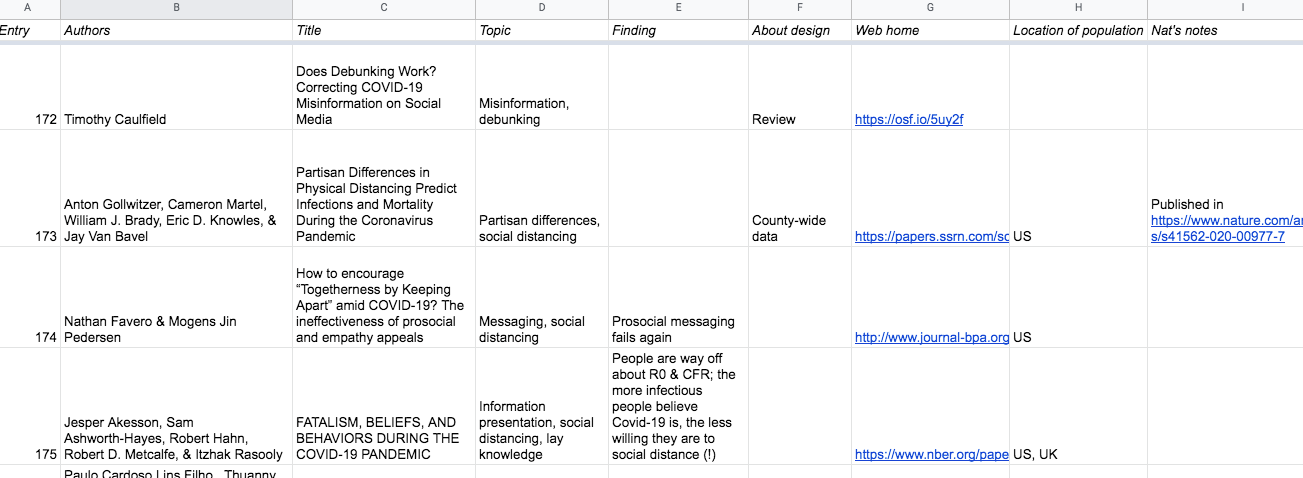What are behavioral scientists doing about COVID-19?
Project Summary
The COVID-19 pandemic unleashed a flood of scientific research. Behavioral scientists quickly realized they had a role in the effort, since the fight against COVID-19 depends on individuals electively engaging in costly behaviors like self isolation, mask-wearing, and vaccination. The Policy Lab has been aggregating and summarizing this work in a [COVID-19 Behavioral Research Tracker](https://tpl.fyi/covid-research-tracker) to make it much easier for policymakers to access.
Why is this issue important?
The COVID-19 pandemic unleashed a flood of scientific research. The scale and focus of collective effort on a single, highly complex problem is without modern precedent. Behavioral scientists quickly realized they had a role in the effort,1 since the fight against COVID-19 depends on individuals electively engaging in costly behaviors like self isolation, mask-wearing, and vaccination. Given the time-sensitive nature of this work, many researchers made their findings public by posting pre-prints online. How is one to keep track of this tidal wave of information?
What did we do?
Starting March 31st, 2020, The Policy Lab began tracking papers in an attempt to build a searchable inventory of all publications related to behavioral science aspects of the COVID-19 response. We conducted weekly Google Scholar searches using the search terms ‘COVID-19’ + ‘behavioral,’ which uncovered research on topics like why people wear a mask or not, why they may be reluctant to vaccinate, and so forth. For each new paper, we transferred the authors, title, abstract, and weblink to a dedicated database, assigned keywords to each entry, recorded the location of the population studied, and commented on the findings or research designs when the spirit moved us.
Strictly epidemiological studies, biomedical research, and papers reporting only clinical psychology measures (e.g., depressive symptoms) were not included. Everything else was fair game, from surveys of hundreds of thousands of Americans to investigations of special populations like Vietnamese medical students or Nigerian healthcare workers. Countless topics are covered, from UK students’ beliefs about school reopenings to misinformation sharing in Bangladesh; many papers are surveys or survey experiments, but some directly measure health behaviors like mask-wearing, social distancing, use of hand sanitizer or face-touching.
What’s the product, and what can you do with it?
Welcome to The Policy Lab’s COVID-19 Behavioral Science Research Tracker.
The Covid Research Tracker is a living, public document. As of February 2021 there are over 600 entries. You can use it to explore and do targeted searches for work on particular topics, show frequent themes in the literature, locate particular studies by the relevant authors, and so forth.

Our hope is that the Tracker will be an asset for researchers involved in the COVID-19 response as well as anyone interested in the behavioral science at play within the pandemic. We could imagine many uses of the database—and users will surely have many more ideas. For example, if you look at all papers testing different communication appeals for why a person might engage in a health-related behavior (e.g. practice social distancing), you’ll notice that messages appealing to the wellbeing of the community fare no better than, and in some cases worse than, similar messages appealing to the wellbeing of the individual or family. (We replicated this in a survey experiment on COVID-19 vaccine information seeking, by the way - details here.) Or for those interested in the politics of COVID-19, you can use the tracker to parse through the many studies examining the relationship between political party and preventive behaviors or COVID-related beliefs and attitudes.2
What happens next?
The Policy Lab continues to update the tracker. If you see gaps or have additions or improvements to suggest, please email us at thepolicylab@brown.edu.
-
Lunn et al. (2020). Using Behavioral Science to help fight the Coronavirus. Journal of Behavioral Public Administration. Van Bavel et al. (2020). Using social and behavioural science to support COVID-19 pandemic response. Nature Human Behavior.
↩ -
See for instance Geana et al. (submitted). Ideology as a determinant of health behavior.
↩
How to cite this Project: The Policy Lab. (2021, February 23). What are behavioral scientists doing about COVID-19?. The Policy Lab. https://thepolicylab.brown.edu/projects/covid-behavioral-tracker

